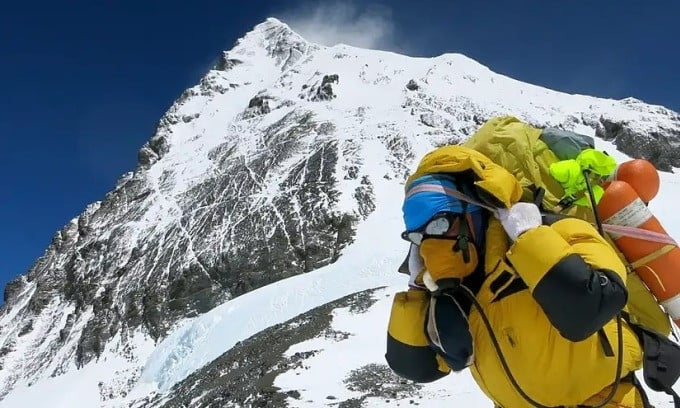
Dave Hahn, an American who has climbed Everest 15 times, said he repeatedly heard loud noises like explosions or falling rocks in many areas during his climbs. Many others also confirmed that strange noises could be heard from a great distance.
Since 2018, Evgeny Podolskiy, a glaciologist at the Hokkaido University Arctic Research Center, and his team have made the first expedition to Everest to find the cause of the noise. While setting up camp in the Trakarding Trambau glacier area, located at an altitude of about 4,800 m above sea level, overlooking Mount Everest, the researcher also confirmed hearing this phenomenon.
The team used seismic sensors, similar to those used to measure earthquakes, to collect data on the glacier's vibrations. From these results, the team realized a connection between the strange sound and a drop in temperature after sunset.
"The glacier develops thermal cracks at night, which creates the explosions," Podolskiy said.
During the day, the team only needed to wear T-shirts, but at night, the temperature dropped to minus 15 degrees Celsius. The change in temperature caused the ice to break, which combined with the harsh weather conditions on Everest, contributed to amplifying the sound. The study also showed that the ice was "very sensitive" to this temperature change.
Not only does the research solve the mystery of the strange noise, it also shows how glaciers are changing as the Earth warms due to climate change.
The Himalayas are known as the “third pole” because of their abundance of fresh water, but climate change is causing glaciers to melt faster than before. The Earth warms during the day, then suddenly drops in temperature at night, causing the ice to break faster. In addition to strange explosions, this can also create earthquakes and floods that directly affect people living nearby.
At 8,848 m above sea level, Everest is the highest mountain in the world . Since the 1920s, 330 climbers have died while conquering the "roof of the world", 200 corpses still lie on the way to the summit. At the end of April, this year's Everest climbing season officially began with 478 climbers granted permits, 20% less than the same period in 2023.
This year, climbers will be fitted with electronic chips to aid rescue efforts. This is also the first year that Everest climbers will be required to carry their own fecal bags to dispose of their waste down the mountain.
TN (according to VnE)Source


![[Photo] Bustling Mid-Autumn Festival at the Museum of Ethnology](https://vphoto.vietnam.vn/thumb/1200x675/vietnam/resource/IMAGE/2025/10/4/da8d5927734d4ca58e3eced14bc435a3)

![[Photo] General Secretary To Lam attends the 8th Congress of the Central Public Security Party Committee](https://vphoto.vietnam.vn/thumb/1200x675/vietnam/resource/IMAGE/2025/10/4/79fadf490f674dc483794f2d955f6045)


![[Photo] Solemn opening of the 8th Congress of the Central Public Security Party Committee, term 2025-2030](https://vphoto.vietnam.vn/thumb/1200x675/vietnam/resource/IMAGE/2025/10/4/f3b00fb779f44979809441a4dac5c7df)
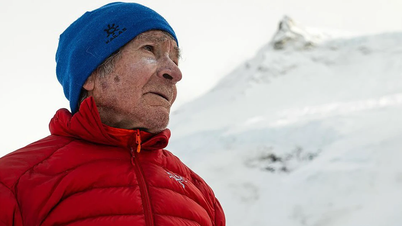

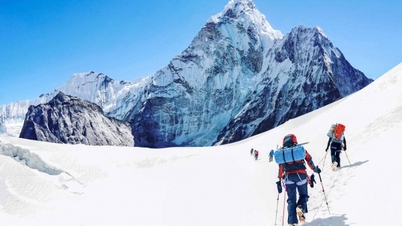

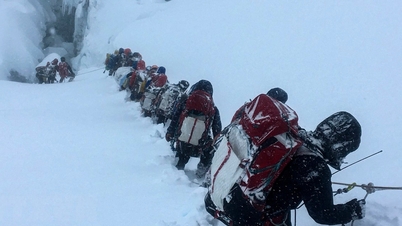




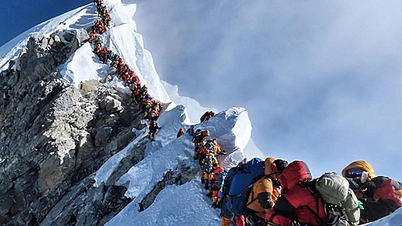
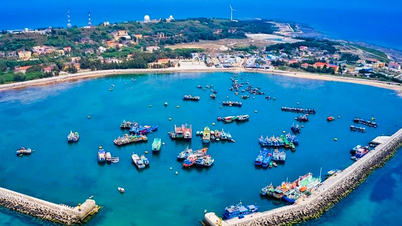









































![[VIDEO] Summary of Petrovietnam's 50th Anniversary Ceremony](https://vphoto.vietnam.vn/thumb/402x226/vietnam/resource/IMAGE/2025/10/4/abe133bdb8114793a16d4fe3e5bd0f12)
![[VIDEO] GENERAL SECRETARY TO LAM AWARDS PETROVIETNAM 8 GOLDEN WORDS: "PIONEER - EXCELLENT - SUSTAINABLE - GLOBAL"](https://vphoto.vietnam.vn/thumb/402x226/vietnam/resource/IMAGE/2025/7/23/c2fdb48863e846cfa9fb8e6ea9cf44e7)






























Comment (0)